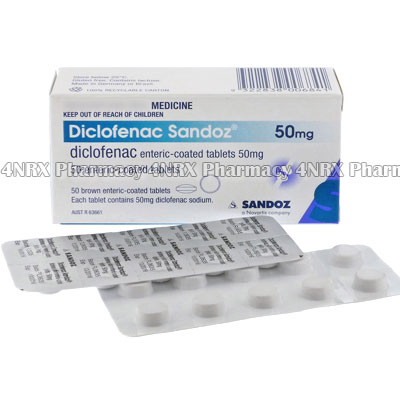 |
Home  Pain Pain  Diclofenac Sandoz (Diclofenac Sodium) Diclofenac Sandoz (Diclofenac Sodium) |
|
|||||||||
|
|
Diclofenac Sandoz (Diclofenac Sodium)
What is Diclofenac Sandoz (Diclofenac Sodium) used for? Diclofenac Sandoz (Diclofenac Sodium) is an oral non-steroidal anti-inflammatory drug (NSAID) prescribed to treat patients suffering from arthritis. The medication prevents the action of chemicals in the body released in response to injuries that cause swelling, pain, and irritation associated with these conditions. This action may also make it useful for treating other similar conditions such as gout, lower back pain, or pain caused by injuries such as sprains or strains. Your physician may also prescribe it to treat other unlisted conditions. How should I use Diclofenac Sandoz (Diclofenac Sodium)? Diclofenac Sodium (Diclofenac Sodium) is normally prescribed to be taken once or twice each day at a dosage of one tablet. The best regimen for your particular condition will be determined by your health and the severity of your symptoms. These doses should be swallowed with a large glass of water and can be taken with or without food, but a meal should be eaten before administration if you experience nausea. Do not split, chew, or crush the tablets before use to avoid unintentionally destroying or altering the effects of their contents. Ask your physician if you have any questions about the medication to ensure the correct administration. What are the side effects of Diclofenac Sandoz (Diclofenac Sodium)? Side effects associated with the use of Diclofenac Sodium (Diclofenac Sodium) include:
Inform your physician if any symptoms become intense or if more serious side effects occur such as stiff muscles, chest pain, swelling, weight gain, urinary retention, sensitive skin, severe skin reaction, darkened urine, discolored stools, or jaundice. These conditions may need emergency medical attention or changes to your dosage to prevent further complications from occurring. Please Note Do not begin using Diclofenac Sodium (Diclofenac Sodium) if you are in the third trimester of pregnancy or if you have an active ulcer, severe heart failure, severe kidney failure, severe liver failure, or if you have had a bad reaction to other NSAID medications. It is also important to inform your physician if you have cerebrovascular disease, heart disease, inflammatory bowel disease, a history of ulcers, history of asthma, diabetes, clotting disorders, systemic lupus, poor circulation, porphyrias, history of allergies, decreased kidney function, decreased liver function, or if you are a smoker. These conditions may cause unexpected problems during your treatment requiring adjustments to your dosage or frequency of administration. Strictly follow all instructions provided to you by your physician or pharmacist while using Diclofenac Sodium (Diclofenac Sodium). Optimum and safe dosage can differ based on the patient and the condition being treated. As this medication may be unsafe for certain patients, it is essential you always inform your physician if you are pregnant or breastfeeding, as well as if you have any allergies, other illnesses, or ongoing health conditions, and if you are taking any other form of medication, supplements, or herbal products. Immediately seek emergency medical care if you have an allergic or hypersensitive reaction. Common signs of a reaction include hives, swelling, skin rashes, chest pains, as well as trouble breathing or swallowing. 
|
||||||||||||||||||||||